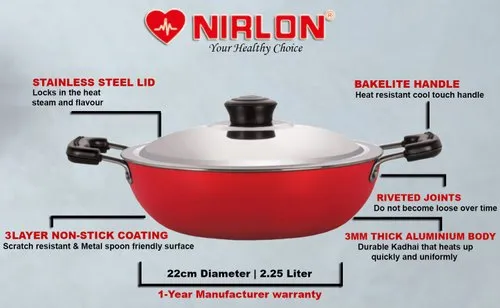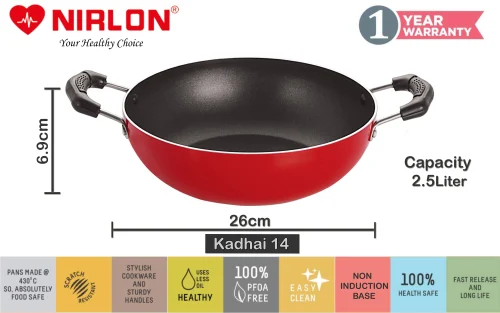Nirlon 2.25L Deep Kadai With SS Lid
₹469.0
| Minimum Order Quantity | 100 Piece |
| Shape | Round |
| Brand | Nirlon |
| Size | 22 cm |
| Capacity | 2.25 L |
| Material | Aluminum |
| Color | Red |
| Country of Origin | Made in India |
| Thickness | 3 mm |
- Description
- Additional information
- Reviews (0)
- Q & A
- Sustainability Remark
- More Offers
- Store Policies
- Inquiries
Product Details:
Durable Cookware that heats up quickly and uniformly
Lasts longer than ordinary non-stick
Conducts heat fast and evenly
Heat Resistant Bakelite Handles For Easy Grip
| brands | Nirlon |
|---|
You must be logged in to post a review.
Q & A
General overview of the carbon footprint associated with aluminum kadhai production and its potential environmental impact.
The primary source of the carbon footprint for aluminum kadhai comes from the extraction and production of aluminum metal. The primary aluminum production involves the extraction of alumina from bauxite ore using energy-intensive processes like the Bayer process and then smelting alumina to produce aluminum metal in electrolytic cells. The smelting process consumes a significant amount of electricity, and if the electricity comes from fossil fuel-based power plants, it can result in substantial greenhouse gas emissions, primarily carbon dioxide (CO2).
If the aluminum kadhai is made from recycled aluminum, the carbon footprint is generally lower. Recycling aluminum requires significantly less energy compared to primary production, leading to reduced greenhouse gas emissions.
The carbon footprint is also affected by how the aluminum kadhai is used and maintained. If it is used efficiently and lasts for a long time, its overall impact will be lower. At the end of its life, if the kadhai is recycled instead of ending up in a landfill, it can contribute to reducing its carbon footprint.
General Inquiries
There are no inquiries yet.




Reviews
There are no reviews yet.